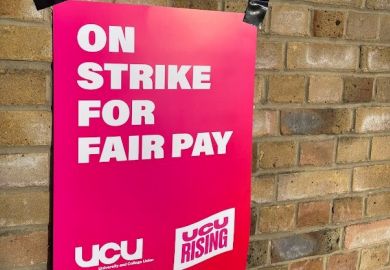More strikes are set to disrupt UK universities at the start of the next academic year, with little sign of long-running industrial action being resolved.
The University and College Union (UCU) said its higher education committee has backed further action – and to continue its marking boycott – while it makes preparations to hold a reballot that could extend the dispute into 2024.
Exact dates for nationwide strikes in September are yet to be announced but will likely impact welcome weeks and the first days of term for a new cohort of students.
It comes after UCU action severely disrupted the end of the last academic year, when the boycott left thousands of students unable to graduate as planned because of delays receiving their final grades. Members participating in this action have been hit with large pay deductions, with universities enforcing a strict line on partial performance.
The higher education minister Robert Halfon wrote to UCU and employer body the Universities and Colleges Employers Association (Ucea) last week to urge them to work towards resolving the impasse after further talks broke down without agreement.
UCU has called for an above-inflation pay rise and action on working conditions and precarious contracts but Ucea has claimed that the sector cannot afford to improve on the 5 to 8 per cent rise already awarded to staff.
“We will not be bullied into accepting gig economy universities, nor will we accept employers imposing punitive pay deductions,” said UCU general secretary Jo Grady announcing the latest escalation.
“While we have agreed to requests for a joint review of sector finances, employers have made no attempt to compromise on the key issues. If they had shown some goodwill, the boycott could now be over. Instead, tens of thousands of students have been impacted and strike action is likely to stretch into next year.”
She accused vice-chancellors of deciding that “crushing their own workers is more important than seeing students graduate after years of hard work”, something she called a “national scandal”.
“The UK higher education sector presents itself as a world leader, but it is riddled with casualisation, insecurity and low pay – our members have no choice but to stand up for themselves,” she added.
“Therefore, the marking boycott will continue, we will call more strike action in September and we will now begin plans to reballot university staff so we can take further action in the coming academic year.”
Union members have warned that any gap between the end of the current mandate – which expires at the end of September – and a fresh ballot could lead to universities’ forcing boycotters to tackle the assessment backlog.
In a message to members, Dr Grady said only that the ballot would come in the “coming months”. The union will seek views on how it should use the “tactic” of the marking boycott in the coming months, she added.
Raj Jethwa, chief executive of Ucea, said the “extremely disappointing decision” to call more strikes would “once again force UCU members to target students”.
“While Ucea respects the right of workers to take industrial action, the choice of the marking and assessment boycott, described by Jo Grady as a ‘tactic’, is extremely concerning,” he added.
“As minister Halfon points out, ‘action that damages students’ prospects is the wrong thing to do’. UCU must be honest with its members about the fact that there is no possibility of a further pay uplift in the 2023-24 pay round and that these aspects of the talks are complete.”
Ucea was still awaiting a response on its proposal to look at other ways of progressing the dispute such as holding an independent review of sector finances and further talks on pay-related matters facilitated by Acas, Mr Jethwa said.
Register to continue
Why register?
- Registration is free and only takes a moment
- Once registered, you can read 3 articles a month
- Sign up for our newsletter
Subscribe
Or subscribe for unlimited access to:
- Unlimited access to news, views, insights & reviews
- Digital editions
- Digital access to THE’s university and college rankings analysis
Already registered or a current subscriber? Login








